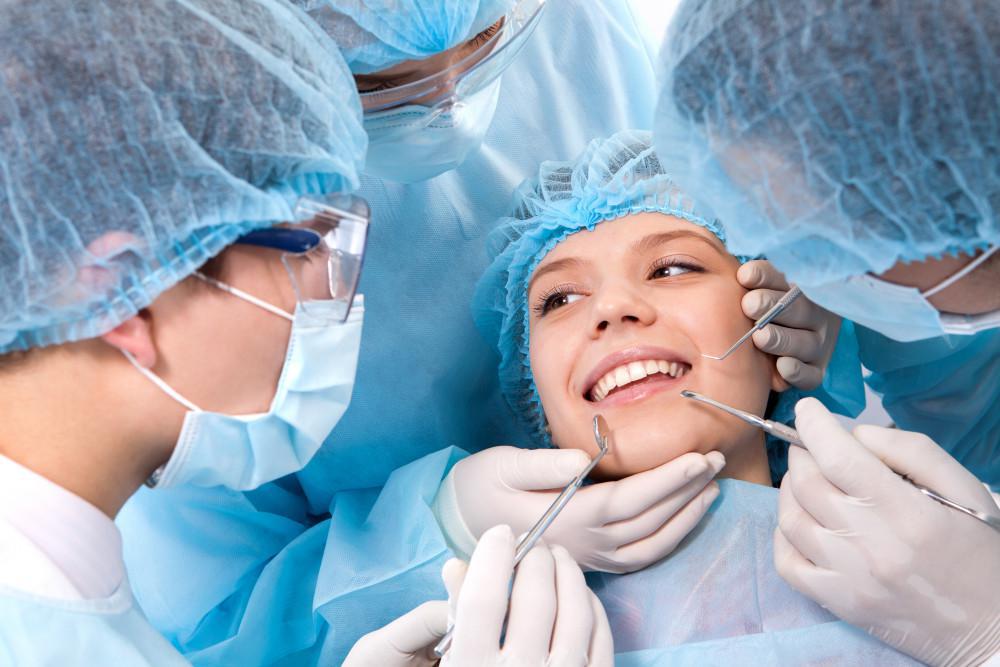Oral Surgery
Oral surgery is a branch of dentistry that deals with the surgical management of head, face, jaws and the neck region. This involves managing facial traumas, reconstruction of facial structures and management of any dental anomaly.
You may require surgical intervention if you have
- Facial trauma
- Any facial anomaly
- Cysts or tumours of the face
- Impacted third molar
- Any other impacted tooth
- Replacement of missing tooth via placement of an implant
- Removing a high frenal attachment
- Management of tongue ties
- Surgical management of any tissue or bone overgrowth in the mouth
- Gum surgeries
We are equipped to provide all the surgical interventions at Madhav Multispecialty Dental Clinic. The most common reason for which people need a surgical intervention is an impacted tooth.
What is an impacted tooth?
Any tooth that fails to erupt into the oral cavity is partially or fully submerged inside the bone. The most common impacted tooth is the wisdom tooth. This could be due to lack of adequate space or due to a development anomaly that leads to wrong placement of the tooth in the jaws.
How would I know that I have an impacted tooth?
A wisdom tooth usually has trouble erupting. Most of the times, it gives discomfort during eruption.
This could be in the form of
- Pain towards the last tooth in the jaw
- Pain while opening the mouth
- Swelling around the erupting tooth
- Food lodgement around that area
What should be done if I have symptoms mentioned above?
If you have of the symptoms mentioned above, this means that you could have an erupting wisdom tooth.
Whenever a patient presents to us with these symptoms, we:
Investigate: We check the patient clinically and then evaluate the position of the tooth with the help of a computerised x-ray. Once we observe the patient, we decide whether the tooth can erupt or it is in a position where it cannot move at all. If the investigations reveal that the tooth can move, then we:
- Wait and watch for some time and provide symptomatic relief with medicines
- Perform operculectomy : This is a procedure in which the overgrown tissue is removed and space is made for the erupting tooth.
If the tooth is in a position where it cannot move towards the path of eruption then we perform disimpaction.
What is Disimpaction?
A wisdom tooth can be impacted in bone in at least four different positions. It can be Mesioangular: It is inclined towards the second molar.
Distoangular : The wisdom tooth is inclined away from the second molar.
Horizontal: The wisdom tooth is in a lying position in the bone and has a huge bone cover over it.
Vertical: The tooth is in a standing position and some portion of it covered in bone and makes it difficult to erupt into the oral cavity.
Whenever a wisdom tooth is present in any of these positions, it fails to erupt and it has to be removed surgically.
The surgical procedure of removing an impacted tooth from the jaw is known as Disimpaction.
Dr. Ritika Wadhwani has done advanced certification in Disimpactions. Her perseverance combined with her upgraded skills helps her deliver the best to the patient.
What is the post operative care after Disimpaction?
As it’s a surgical procedure, you can have postoperative swelling and difficulty in opening the mouth for a few days. There are a few post operative instructions that can however reduce the symptoms to a great extent:
- Do not spit for 24 hours: This helps in a stable clot formation and helps to prevent the dislodgement of the clot from the surgical site.
- Cold fermentation: Cold fermentation on the outside of the surgical site helps to reduce the inflammation around that area.
- Soft and cold diet for a few days.
- Avoid hard and hot food
- Do not put your hand on the surgical site.
- Avoid brushing around that area for 3-4 days.
- Take the medications that are prescribed. Report if the pain or bleeding does not subside after the extraction.
What would happen if you do not extract an impacted tooth?
An impacted tooth if left untreated can:
- Cause damage to the adjacent tooth
- Frequent episodes of food lodgement
- Cheek biting
- Increased incidence of caries in the adjacent tooth
- Trauma from occlusion and subsequent damage to the temporo mandibular joint.
- Plaque accumulation
How painful is Disimpaction?
Any surgical procedure is performed under anaesthesia and we make it as painless as possible. You would feel pressure of the tooth being removed but pain would not be there.
Would I be able to resume work after Disimpaction?
It would be better to take a day off from the work since your body would take some time to heal. It’s a minor surgical procedure, there could be post operative pain and swelling that can cause discomfort for a day or two.
Why should you visit us to get an impacted tooth treated?
An impacted tooth has to be removed with great precision and accuracy. We have to take care of the delicate structures surrounding the impacted tooth.
We at Madhav Multispecialty Dental Clinic make sure that all your surgical concerns are dealt with great compassion. We understand you fear and your concerns.
Our staff under the expert guidance of Dr. Ritika Wadhwani is sensitive to your needs.
You should visit us because you would be in safe hands.

